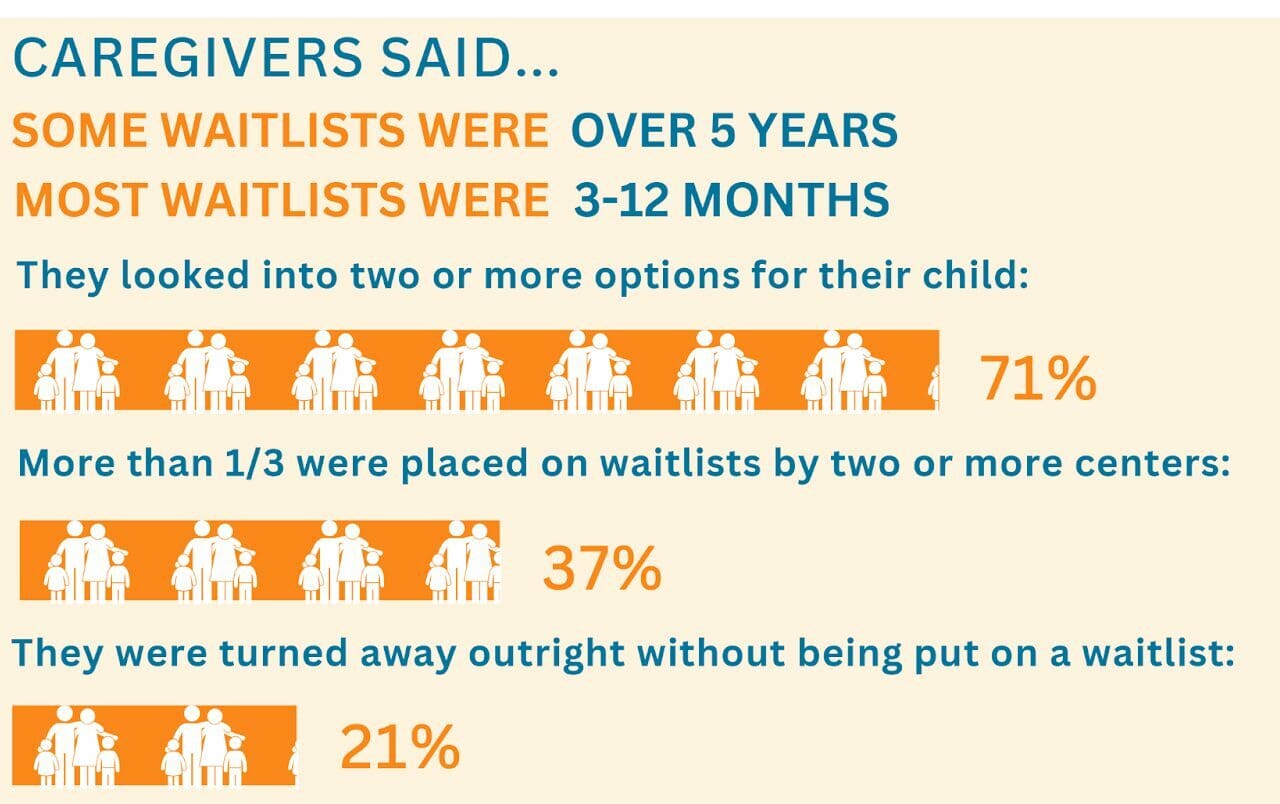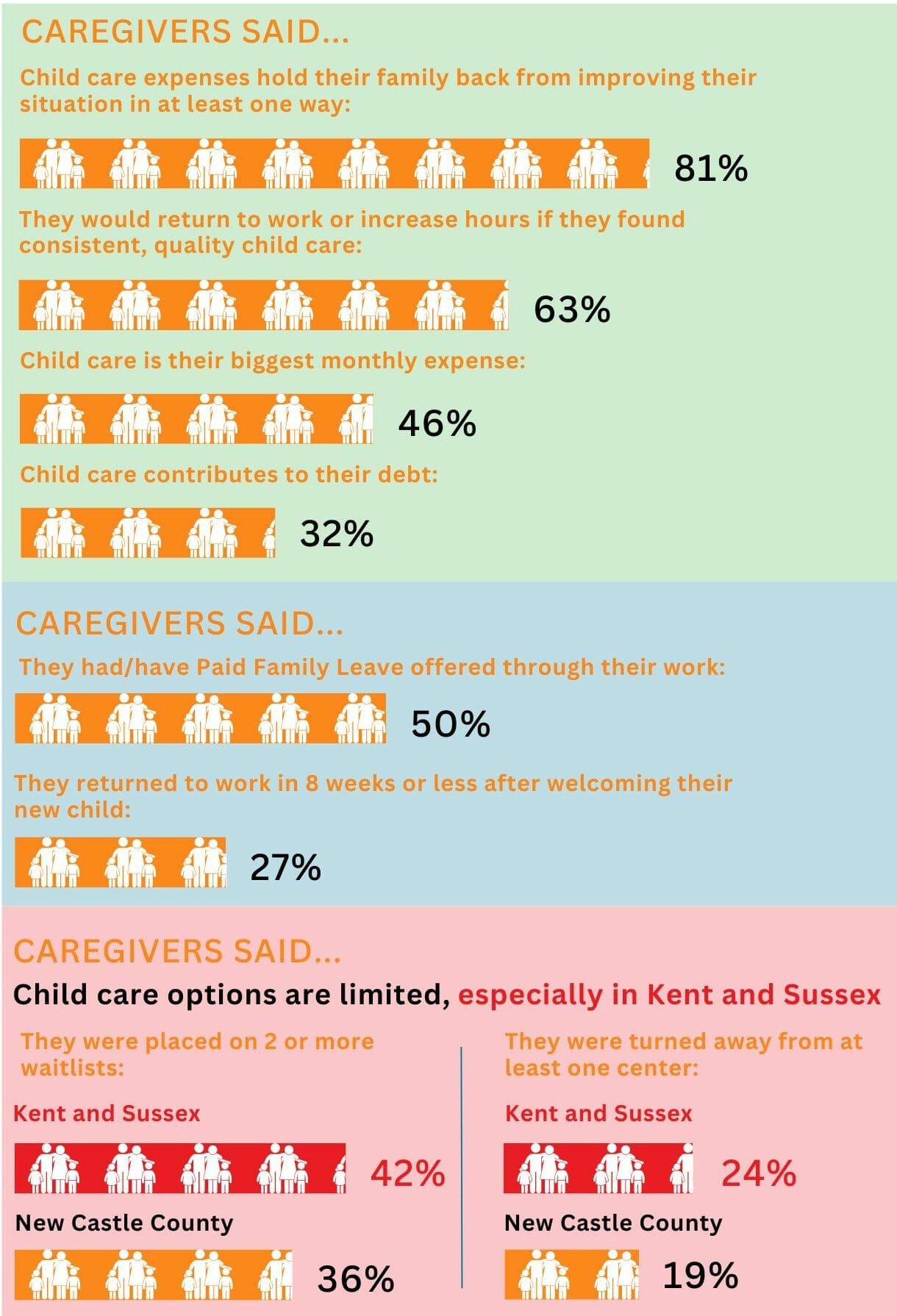A new report from Rodel shows that First State families do not have adequate access to affordable child care.
A coalition of advocacy groups – including Rodel, the Delaware Association for the Education of Young Children, Delaware Readiness Teams and the First State Pre-K – conducted a survey with hundreds of Delaware families to gauge their feelings about child care services.
Caregivers of children 5 years and younger shared common complaints about long waitlists, high prices and a lack of options around them.
According to the survey, 81% of caregivers said the expenses of child care hold their family back from improving their situation.
RELATED STORY: Report: Despite early childhood ed gains, some kids need help
The report found that 71% of caregivers looked at multiple places to send their children too, but 37% of them were waitlisted by at least two centers. 21% were flat-out rejected services.
child care access
The numbers are worse for parents in Kent or Sussex counties. 73% of those people were waitlisted by at least two centers, while only 45% of New Castle County caregivers were.
“Kent and Sussex just don’t have options,” said Toni Dickerson, an administrator at Sussex Preschools and the chair of the Child Care Association of Sussex County. She helped Rodel with the report. Rodel is a nonprofit focused on transforming public education in Delaware.
“For my centers, specifically, we have five locations and three of those locations are the only center based options within the ZIP code,” she said.
The Seaford School District only has one full-time child care center in the district, she said.
Sen. Brian Pettyjohn, R-Georgetown, who’s on the Senate Education Committee, said he agrees with concerns Rodel pointed out, and he has been working across the aisle with his colleagues since the summer to rectify them.
“As they correctly point out, access to pre-K and after school care is becoming exceedingly difficult,” he said. “It’s my hope that the increases recommended by Gov. Carney in the upcoming budget will be adequate to allow child care centers to attract qualified individuals to work at their centers, and thereby opening up spots for additional children.”
Dickerson said Carney’s recommendations are just small steps on the right path.
Carney’s recommendations include:
- Investing more than $10 million in child care programs and raising the income limits of parents who can qualify.
- Changing eligibility for those who use the state’s Purchase of Care program for help with child care to 200% of the poverty level, reaching more children.
- Doubling funding the Early Childhood Assistance Program to $12.2 million, to serve more 3- and 4-year-olds, and provide programs with more resources.
- Allocating funding for House Bill 33 to lower preschool special education student-teacher ratios.
- Utilizing a $8 million federal Preschool Development Grant to help strengthen and expand the state’s early childhood infrastructure to infants and toddlers.
This would create more access and allow more families to be reimbursed for their child care payments, Dickerson said.
She also noted that staffing is a major issue.
One Sussex child care center that she facilitates, for example, has 20 classrooms, but only 12 classrooms are in operation.
Some centers have the space, but don’t have the staff.
Rep. Ruth Briggs King, R-Georgetown, who’s on the House Education Committee, agreed that the issue for child care is adequate staffing and compensation for day care providers.
“There is a huge need for day care workers, which means providers can’t work to capacity,” she said. “This creates a domino effect with ‘help wanted signs’ and families struggling to find options.”
She said the governor’s proposals are not enough to provide comprehensive relief to families.
The lack of options also affects the workforce of Delaware. 63% of those surveyed said they would return to work, or work more hours, if they found consistent, quality child care.
finances of child care
Dickerson said a lot of this is in the hands of legislators, with the following being passed in recent years:
- SB 169 required all programs serving children under the age of 5 to be licensed by the state.
- HB 222 required that all licensed programs ensure children receive lead screenings to mitigate the lead crisis, and ensure that if children qualify for additional services due to lead exposure that they are receiving them.
- SB 82 created a statewide kindergarten/school registration form. This allowed districts and providers to share common kindergarten information to streamline the process for families transitioning from early care to the districts.
- SCR 55 streamlined the regulations for entities serving children under the age of 5 to assist with SB 169.
- SB136 moved the special needs services through IDEA Part C from Delaware Health and Social Services to the Delaware Department of Education, meaning that any child that has special needs from birth through 21 receives consistent DOE services.
- HB202 required all licensed programs complete developmental screenings with families of the children enrolled.
- SCR 36 increased compensation scales for early childhood education professionals.
Dickerson said the staff that are in child care centers are often burnt out, and said the center in Seaford lost two employees just last week because of this.
To view survey results, click here.


Raised in Doylestown, Pennsylvania, Jarek earned a B.A. in journalism and a B.A. in political science from Temple University in 2021. After running CNN’s Michael Smerconish’s YouTube channel, Jarek became a reporter for the Bucks County Herald before joining Delaware LIVE News.
Share this Post





